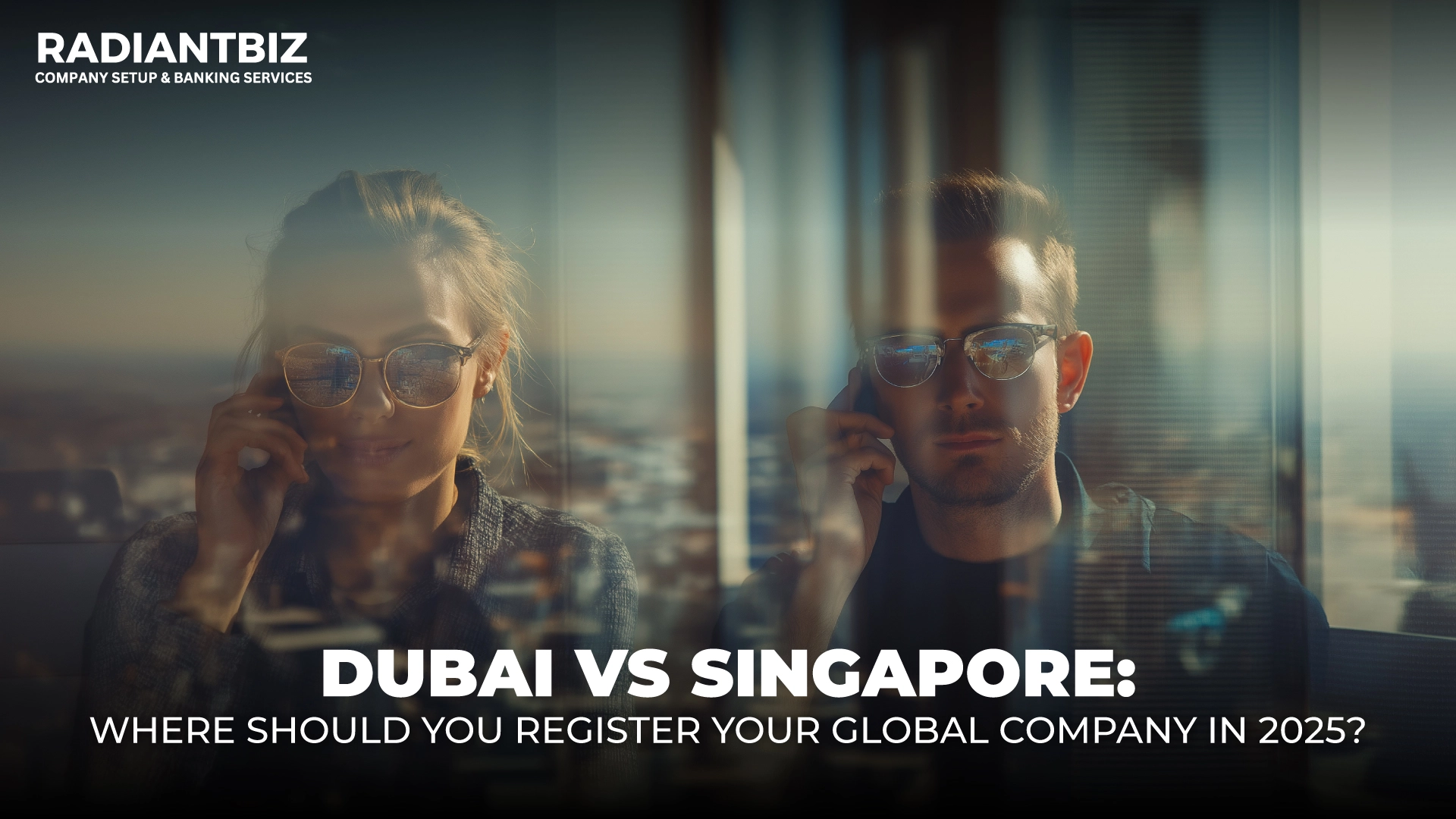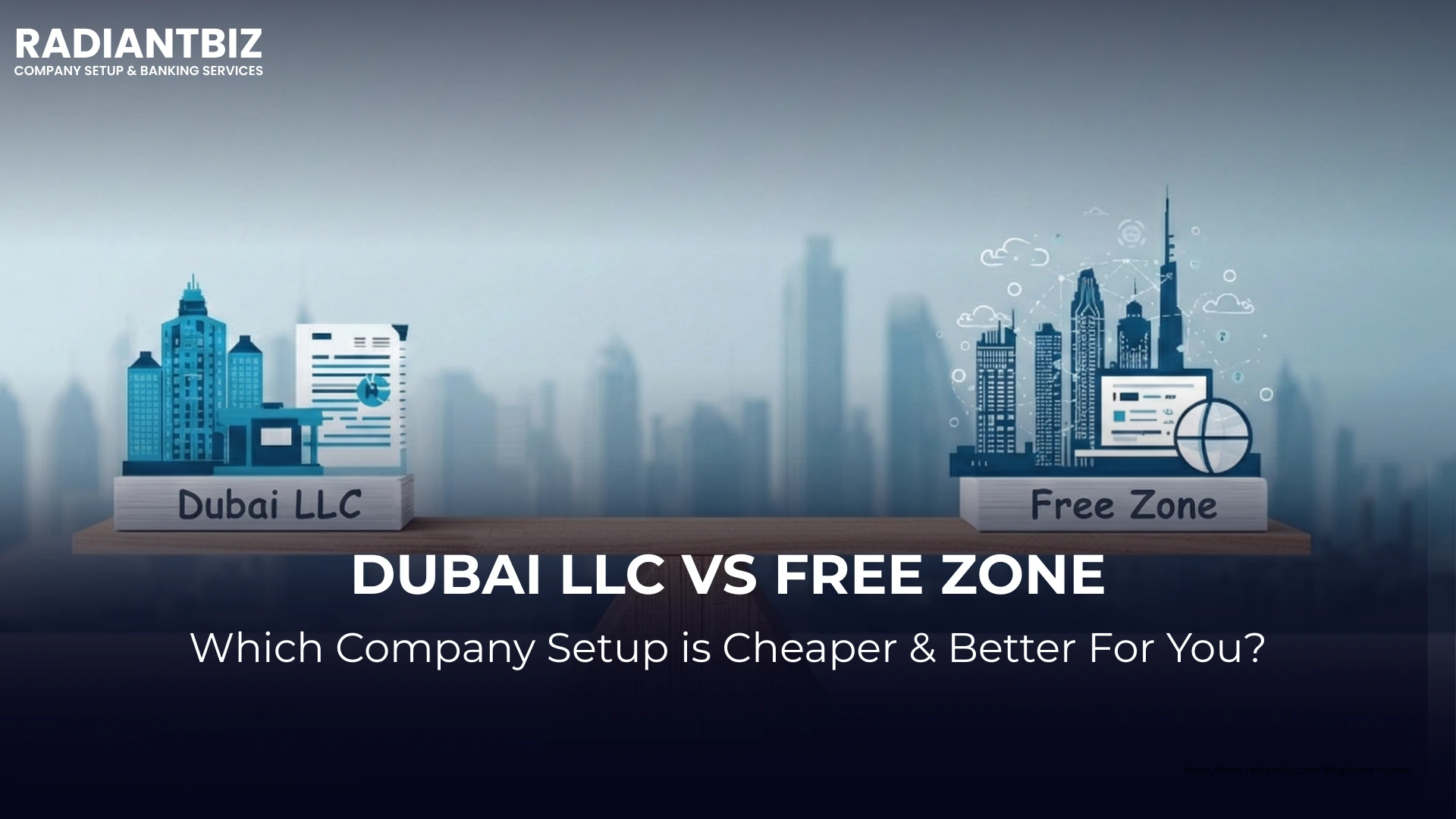Dubai vs Singapore: Where Should You License Your Global Company in 2025?


Table of Contents
As business owners and international investors plan to scale across borders in 2025, there are two cities that consistently make it to the top of strategic business locations: Dubai and Singapore.
Both are leading financial hubs, hotspots for innovation, and portals to high-growth markets. But when it comes to deciding where to license your business, the choice is not one size fits all.
Both places have their own regulatory landscape, taxation system, company culture, and benefits. This manual provides an in-depth comparison of Singapore vs Dubai company formation, covering everything from licensing frameworks and regulatory compliance to taxation, banking, and lifestyle, so you can make an informed choice about which city best suits your international ambitions.
International Relevance: Dubai and Singapore in 2025
Dubai and Singapore are both among the world's most competitive economies. Dubai remains the Middle East's commercial hub, linking Europe, Africa, and Asia through its logistics network and forward-looking economic policies. The UAE's "D33" strategy is driving further evolution in digital trade, sustainability, and innovation.
Singapore, on the other hand, holds its crown as Asia's innovation hub. Equipped with world-class education systems, pro-R&D policies, and robust international treaties, it is popular with tech startups, regional headquarters, and multinational companies. Singapore is also the gateway to the 10-member ASEAN market—one of the fastest-growing economic regions in the world.
Business Licensing in Dubai and Singapore
One of the initial steps in the process of establishing a company is selecting the proper licensing framework. The Dubai vs Singapore business licensing comparison begins with an appreciation of the frameworks available in each nation.
Dubai offers various options. Companies may license with the mainland (onshore) system, enabling them to directly deal with the UAE market. As a result of recent reforms, 100% foreign ownership is then on offer in the majority of sectors, making mainland Dubai a very competitive option.
Alternatively, there are free zones, which target specific sectors like media, fintech, logistics, and crypto. Such zones tend to have full ownership, no customs duties, and quick setup.
Finally, there is the possibility of setting up an offshore company in Dubai, perfect for holding structures, international trade, or asset protection without having to maintain physical offices.
In Singapore, most foreign entrepreneurs set up a Private Limited Company (Pte Ltd). It offers limited liability and credibility for fundraising or global expansion. Licensing is done with ACRA, and the process is fast, usually within a day or two.
However, certain conditions apply, you’ll need at least one resident director, a company secretary, and an annual compliance process that includes filing accounts and annual returns.
Both Dubai and Singapore have contemporary, internet-based company setup mechanisms but the choice of jurisdiction (mainland, free zone, offshore) available in Dubai provides a wider variety of options for business models.
Taxation: A Differentiator
The most-discussed aspect of the UAE vs Singapore business pros comparison is taxation.
Dubai is generally well-known for its tax-free status. Businesses set up in the majority of free zones and which abide by the qualifying activity rules still benefit from 0% corporate tax in 2025.
Mainland businesses face a 9% corporate tax on profits exceeding AED 375,000. Significantly, there is no personal income tax in Dubai, which makes it particularly appealing to founders and high-earning individuals. The UAE does impose 5% VAT, but numerous exports and some industries are zero-rated.
Singapore, on the other hand, has a flat 17% corporate tax. But this is usually lowered through substantial startup tax exemptions and partial refunds. New firms, for example, might be granted tax exemptions over the first SGD 100,000 chargeable income.
Singapore also charges 9% Goods and Services Tax (GST) in 2025 and maintains a progressive personal income tax system that might reach 24%.
If you’re focused on tax optimization, particularly on profits and personal earnings, Dubai stands out. However, Singapore offers predictability and strong bilateral tax treaties, which are particularly useful for companies with cross-border operations in Asia-Pacific.
Banking, Regulation, and Compliance
Opening and managing a business bank account is a key part of running a company, and it differs notably between the two countries.
In Dubai, the banks are more and more compliant with global requirements like AML (Anti-Money Laundering) and UBO (Ultimate Beneficial Ownership). As difficult as it can be to bank offshore companies in Dubai, free zone and mainland businesses tend to have easier account opening, particularly with high business activity and local presence.
All the same, it is possible for the processing to take longer than anticipated as a result of increased due diligence.
Singapore's banking system is regarded as the most effective and safest in the world. Banks such as DBS, UOB, and OCBC provide smooth corporate banking services, fully connected with international financial networks.
The Monetary Authority of Singapore (MAS) provides strong regulatory requirements and digital banking for start-ups is easily accessible. The inconvenience is that documentation requirements and substance requirements may be stricter, particularly for foreign-owned companies.
As far as compliance goes, both places are international standard compliant, but Singapore tends to require more granular annual reporting and audits. Dubai free zones, however, may not need audited accounts based on the company's size and nature of activity.
Talent and Work Visas
Accessing talented individuals and obtaining work visas, both cities have pluses but they go about it in different ways.
Dubai has a lot of visa options. Golden Visa (10 years), Investor Visa, and Freelancer Permits are some of the means by which entrepreneurs and employees can legally stay in the UAE.
Free zones tend to package several visa quotas with office deals. The labor market is diverse with recruitment sources from South Asia, the UK, Europe, and the broader Middle East. There is little nationalization of most private-sector positions, and firms can focus on hiring strictly on the basis of merit and availability.
Singapore, though providing an extremely educated, technologically oriented labor force, is very restrictive in hiring foreign workers with strict hiring quotas and wage limits. EP and EntrePass (for the founders) are typical visa types, but approval is based on company background, job function, and experience.
Singapore has progressively made foreign hiring more restrictive to favor local hiring over the years, which might be a barrier for early-stage startups to assemble international teams.
If the flexibility to hire and access to a vast pool of expats are the goals, Dubai provides greater freedom. But if you need highly specialized experts or are looking to leverage Asia's tech infrastructure, Singapore provides unparalleled quality but at a premium.
Innovation and Sector-Specific Support
Dubai and Singapore have both positioned themselves as cutting-edge, tech-driven economies but with differing approaches.
Dubai is becoming a prominent hub for emerging industries like crypto, Web3, green energy, and logistics. The creation of VARA (Virtual Assets Regulatory Authority) and digital economy free zones like DIFC Innovation Hub highlight Dubai’s ambition to attract the next generation of startups. Government initiatives provide infrastructure, sandbox environments, and pilot funding for early-stage ventures.
Singapore, meanwhile, dominates in biotech, fintech, and high R&D. With the support of government institutions such as Enterprise Singapore, SGInnovate, and A*STAR, the city-state provides grants, accelerator programs, and direct funding to innovation-led businesses. Its university-industry collaboration is also second to none, and the Smart Nation drive has further solidified its position as Asia's innovation leader.
For blockchain or AI tech founders, both cities are viable options, but your desired regulatory framework and access to funding may help tip the balance.
Living and Working Environment
Life in either city is safe, cosmopolitan, and comfortable but with specific differences.
Dubai provides a multiculturally rich, tax-free, luxury lifestyle with much sun, rapidly expanding real estate, and fast growth. It is perfect for entrepreneurs who wish to reinvest returns or live a high standard of living while growing internationally. Summers can be hot, though, and social norms are more traditional in certain regions.
Singapore is always one of the world's top cities for quality of life. It has well-organized public transport, high-quality healthcare, and green city planning. English prevails as a language, and its multiculturalism makes expats' adaptation easy. The cost of living is, however, much higher compared to Dubai, particularly for housing and education.
In the end, lifestyle factors may influence founders depending on family requirements, cultural alignment, or long-term residency ambitions.
Which Jurisdiction Suits Your Needs?
The Dubai vs Singapore company establishment choice is based on your business objectives, industry, and operational requirements.
Choose Dubai if…
Choose Singapore if…
You’re targeting the Middle East, Africa, or South Asia
You’re expanding into Southeast Asia, China, or Asia-Pacific
You want minimal taxation on both profits and personal income
You need robust financial infrastructure and strong IP protection
You value flexibility in visa rules and ease of hiring expat talent
You can comply with stricter foreign hiring policies and local employment quotas
You require offshore or asset-holding structures for international operations
You plan to establish a Pte Ltd or regional HQ in line with global compliance standards.
You’re in crypto, real estate, logistics, tourism, or e-commerce
You’re in fintech, biotech, deep-tech, or R&D-heavy sectors
You prefer a tax-free lifestyle and cost-effective business operations
You prioritize regulatory transparency, government grants, and stability
You want fast-track setup via free zones or offshore options
You prefer a prestigious, globally recognized legal environment
Both cities have unique strengths, and most international companies ultimately domicile in both to reap double-market access. The question is where you need to grow up, where your customers are, and how domestic policies fit with your long-term strategy.
If you're expanding worldwide in 2025, it has never been a more opportune time to make the decision between these two giants wisely.
Seek our professional on-the-ground guidance, contact us via mail at info@radiantbiz.com or WhatsApp & call us at +971 52 132 2895!



2.png)




.avif)